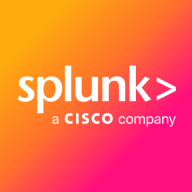

Splunk Enterprise Security and LogRhythm SIEM are competitors in the security information and event management domain, each providing distinct features for threat detection and response. Users rate Splunk higher for pricing and support, while LogRhythm stands out for its extensive feature set, positioning it as a favored option for some seeking a comprehensive solution.
Features: Splunk Enterprise Security offers real-time threat detection, customizable dashboards, and extensive data analytics. It also supports rapid searches across large log volumes, and user-friendly dashboards for data visualization. Conversely, LogRhythm SIEM provides advanced threat lifecycle management, integrated incident response workflows, and user behavior analytics. Its broad array of features includes easy-to-use compliance reporting tools and security alerts.
Room for Improvement: Splunk could benefit from enhanced automation features and improved user onboarding experiences. It may also need better integration capabilities to compete with other solutions. LogRhythm SIEM can improve its interface for non-technical users and enhance scalability options. Furthermore, it could expand its library of built-in integrations to support a wider range of devices.
Ease of Deployment and Customer Service: Splunk Enterprise Security is recognized for its adaptable deployment model, supporting diverse environments with reliable support. LogRhythm stands out with an intuitive deployment process and robust customer service, which emphasizes comprehensive setup assistance, making it user-friendly for new customers.
Pricing and ROI: Splunk Enterprise Security involves a higher initial setup cost but promises substantial ROI through scalable data solutions and customization options. LogRhythm SIEM offers more moderate setup costs and delivers strong ROI thanks to its extensive feature range and efficient threat management. Splunk's pricing can be higher, yet its long-term value is advantageous for organizations requiring extensive data handling. LogRhythm balances cost-effectiveness with broad functionality, appealing to various business needs.
The documentation for Splunk Enterprise Security is outstanding. It is well-organized and easy to access.
We couldn't calculate what would have been the cost if they had actually gotten compromised; however, they were in the process, so every investment was returned immediately.
On average, my SecOps team takes probably at least a quarter of the time, if not more, to remediate security incidents with Splunk Enterprise Security compared to our previous solution.
The technical support is good; we have a separate portal for partners, and since we are paying for the service, they provide a response timeframe based on severity—critical issues are addressed within four hours, medium issues within one day, and non-urgent issues may take a couple of days.
LogRhythm SIEM is quite complex, but that complexity allows us to specifically tailor a solution to the customer while some others are not as flexible.
Customer support is very helpful and effectively solves my problems.
We have paid for Splunk support, and we’re not on the free tier hoping for assistance; we are a significant customer and invest a lot in this service.
I have had nothing but good experiences with Splunk support, receiving timely and helpful replies.
We've had great customer success managers who have helped us navigate scaling from 600 gigs to 30 terabytes.
LogRhythm SIEM is highly scalable as it has modular components allowing me to expand storage, indexing, or other resources as needed.
LogRhythm SIEM is scalable; it can handle about 200 or 500 devices without much difference.
The scalability of LogRhythm SIEM is good enough, warranting an eight out of ten rating.
We currently rely on disaster recovery and backup recovery, which takes time to recover, during which you're basically blind, so I'm pushing my leadership team to switch over to a clustering environment for constant availability.
It is one of the things that separates it from other tooling, and if not, it is the most scalable solution out there.
They struggle a bit with pure virtual environments, but in terms of how much they can handle, it is pretty good.
The platform needs regular updates to fix problems encountered with each quarterly patch and version release.
LogRhythm SIEM still needs improvement regarding stability, particularly in environments with heavy data consumption.
They test it very thoroughly before release, and our customers have Splunk running for months without issues.
Splunk has been very reliable and very consistent.
We need more SMEs, and there is no mechanism to tell us about indexer or search head issues.
I have noticed some problems with parsing errors, event mismatches, and data mismatching, so ensuring accurate parsing and continuous improvement according to device updates are my basic expectations as a detection engineer.
There is currently no way to determine how much data is being consumed in terms of gigabytes, terabytes, or petabytes from particular devices or environments.
If LogRhythm SIEM could make a lightweight version of their solution, that would be quite competitive because some of my customers have a very large need but refuse to go with LogRhythm SIEM due to its complexity and high resource intensity.
Improving the infrastructure behind Splunk Enterprise Security is vital—enhanced cores, CPUs, and memory should be prioritized to support better processing power.
Splunk Enterprise Security is not something that automatically picks things; you have to set up use cases, update data models, and link the right use cases to the right data models for those detections to happen.
For any future enhancements or features, such as MLTK and SOAR platform integration, we need more visibility, training, and certification for the skilled professionals who are working.
The license cost is around $10 per MPS.
I find LogRhythm SIEM affordable, as it is a bit less costly than QRadar.
I saw clients spend two million dollars a year just feeding data into the Splunk solution.
The platform requires significant financial investment and resources, making it expensive despite its comprehensive features.
I find it to be affordable, which is why every industry uses it.
The seamless integration for case management, along with a user-friendly dashboard user interface, makes tasks like threat hunting more efficient.
We have enough budget for cloud deployment, but we choose to keep it on-prem to ensure data privacy; cyberattacks are a concern, but data privacy is the foremost priority due to sensitive government information.
This helps SOC analysts significantly as they can monitor all log sources through a dashboard, quickly identifying which sources haven't reported within their specified timeframes.
This capability is useful for performance monitoring and issue identification.
I assess Splunk Enterprise Security's insider threat detection capabilities for helping to find unknown threats and anomalous user behavior as great.
Splunk Enterprise Security provides the foundation for unified threat detection, investigation, and response, enabling fast identification of critical issues.
| Product | Market Share (%) |
|---|---|
| Splunk Enterprise Security | 7.2% |
| LogRhythm SIEM | 2.6% |
| Other | 90.2% |
| Company Size | Count |
|---|---|
| Small Business | 39 |
| Midsize Enterprise | 38 |
| Large Enterprise | 83 |
| Company Size | Count |
|---|---|
| Small Business | 112 |
| Midsize Enterprise | 50 |
| Large Enterprise | 266 |
LogRhythm SIEM Platform is an award-winning platform in security analytics. With more than 4,000 customers globally, LogRhythm SIEM is an integrated platform that helps security operations teams protect critical infrastructure and information from emerging cyberthreats. Ultimately, LogRhythm SIEM is an integrated set of modules that contribute to the security team’s fundamental mission: rapid threat monitoring, threat detection, threat investigation, and threat neutralization. LogRhythm SIEM is for organizations that require an on-premises solution and offers:
● Streamlined workflow
● Secure data access
● Real-time visibility
● A unified user experience
● Management customization
Security information and event management (SIEM) solutions have been evolving for over a decade; their core functionality still acts as the most effective foundation for any organization’s technology stack. A SIEM solution enables an organization to centrally collect data across its entire network environment to gain real-time visibility into activity that may pose a risk to the organization. SIEM technology addresses threats before they become significant financial risks while simultaneously helping better manage an organization’s assets.
LogRhythm SIEM has many key features and capabilities, including:
● High-Performance Log Management: LogRhythm SIEM offers structured and unstructured search capabilities which allows users to swiftly search across an organization’s vast data to easily find answers, identify IT and security issues, and troubleshoot issues. Users can efficiently process and index terabytes of log data daily.
● Network and Endpoint Monitoring: Forensic sensors allow users to gain deep visibility into endpoint and network activity. Users can see behavioral anomalies and better respond to incidents.
● SmartResponse™ Automation: LogRhythm SIEM allows users to centrally execute pre-staged actions that automate incident investigatory tasks and responses.
● Automated Machine Analytics: LogRhythm SIEM's AI Engine continuously analyzes all collected security incidents and forensic data. Security teams are delivered precise, real-time intelligence about risk-prioritized threats.
● Case and Security Incident Management: LogRhythm SIEM offers an integrated workflow so that threats don’t slip through the cracks. Collaboration tools help centrally manage and track investigations.
● User and entity behavior analytics (UEBA): Embedded deterministic UEBA monitoring helps protect against insider threats.
● Security orchestration, automation, and response (SOAR): LogRhythm SIEM includes our embedded SOAR solution to increase efficiency and higher-quality incident response with low mean time to response (MTTR).
Benefits to Using LogRhythm SIEM
● The platform offers great value to security and IT operations. Users have the ability to map their security and IT operations to existing frameworks such as NIST and MITRE ATT&CK.
● The platform offers broad integration across security and IT vendors: Users benefit from support for integration with hundreds of security and IT solutions. In turn, this further extends SIEM capabilities and data collection.
● The platform provides compliance adherence, enforcement, and reporting: The prebuilt compliance modules automatically detect violations as they occur and remove the burden of manually reviewing audit logs.
Reviews from Real Users
LogRhythm SIEM stands out among its competitors for a number of reasons. Two major ones are its ability to be customized and its quick performance of queries.
Jason G., a senior cybersecurity engineer, writes, "I have found the Advanced Intelligence Engine has provided the most value to us because we can customize alarms based on our requirements and have created hundreds of alarms that notify different people for different scenarios."
Andy W., principal consultant at ITSEC Asia, notes, “LogRhythm SIEM covers all our primary security analysis needs. It makes it easier for us to analyze threats and improves our response times. It's a versatile platform that performs queries fast compared to other SIEM solutions.”
Splunk Enterprise Security delivers powerful log management, rapid searches, and intuitive dashboards, enhancing real-time analytics and security measures. Its advanced machine learning and wide system compatibility streamline threat detection and incident response across diverse IT environments.
Splunk Enterprise Security stands out in security operations with robust features like comprehensive threat intelligence and seamless data integration. Its real-time analytics and customizable queries enable proactive threat analysis and efficient incident response. Integration with multiple third-party feeds allows detailed threat correlation and streamlined data visualization. Users find the intuitive UI and broad compatibility support efficient threat detection while reducing false positives. Despite its strengths, areas such as visualization capabilities and integration processes with cloud environments need enhancement. Users face a high learning curve, and improvements in automation, AI, documentation, and training are desired to maximize its potential.
What Are the Key Features of Splunk Enterprise Security?In specific industries like finance and healthcare, Splunk Enterprise Security is instrumental for log aggregation, SIEM functionalities, and compliance monitoring. Companies leverage its capabilities for proactive threat analysis and response, ensuring comprehensive security monitoring and integration with various tools for heightened operational intelligence.
We monitor all Security Information and Event Management (SIEM) reviews to prevent fraudulent reviews and keep review quality high. We do not post reviews by company employees or direct competitors. We validate each review for authenticity via cross-reference with LinkedIn, and personal follow-up with the reviewer when necessary.